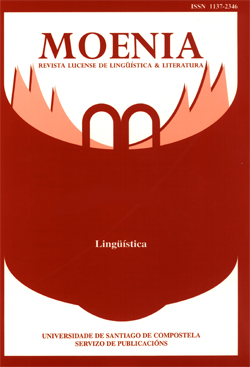When publishing in Moenia, the author/authors cedes/cede all the exploitation rights of his/her/their article (including distribution, public communication, reproduction and transformation) to the University of Santiago de Compostela, which, under the conditions and within the restrictions stated in the legislation on intellectual property, is the holder of the copyright and, therefore, of all the patrimonial rights expressed, while the author/authors maintain all the moral rights corresponding to them by the law (art. 14 TRLPI).
Not withstanding the above considerations, all contents of this edition, except where otherwise noted, are distributed open access under a Creative Commons BY NC ND 4.0 international license. Any form of reproduction, distribution, public communication or transformation of this work not included under the Creative Commons BY-NC-ND 4.0 license can only be carried out with the express authorization of the copyright holder, save where otherwise provided by the law. You can access the full text of the license at https://creativecommons.org/licenses/by-nc-nd/4.0/legalcode






